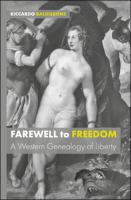Farewell to Freedom
A Western Genealogy of Liberty
Abstract
Understandings of freedom are often discussed in moral, theological, legal and political terms, but they are not often set in a historical perspective, and they are even more rarely considered within their specific language context. From Homeric poems to contemporary works, the author traces the words that express the various notions of freedom in Classical Greek, Latin, and medieval and modern European idioms. Examining writers as varied as Plato, Aristotle, Luther, La Boétie, Hobbes, Rousseau, Kant, Stirner, Nietzsche, and Foucault among others, this theoretical mapping shows old and new boundaries of the horizon of freedom. The book suggests the possibility of transcending these boundaries on the basis of a different theorization of human interactions, which constructs individual and collective subjects as processes rather than entities. This construction shifts and disseminates the very locus of freedom, whose vocabulary would be better recast as a relational middle path between autonomous and heteronomous alternatives.
Keywords
individual; theology; mastery; liberty; autonomy; freedom; Aristotle; PlatoDOI
10.16997/book15ISBN
9781911534600; 9781911534624; 9781911534631OCN
1051782805Publisher
University of Westminster PressPublisher website
https://www.uwestminsterpress.co.uk/Publication date and place
2018Classification
Language: history and general works
Ancient history
Philosophical traditions and schools of thought
Social and political philosophy
Political science and theory
Political control and freedoms


 Download
Download